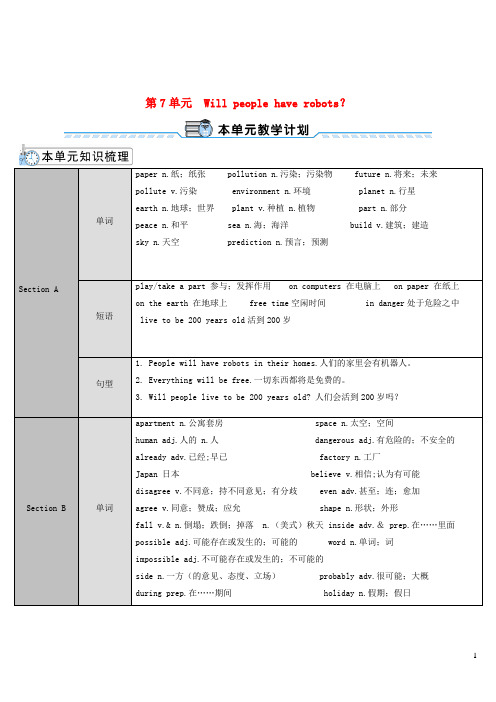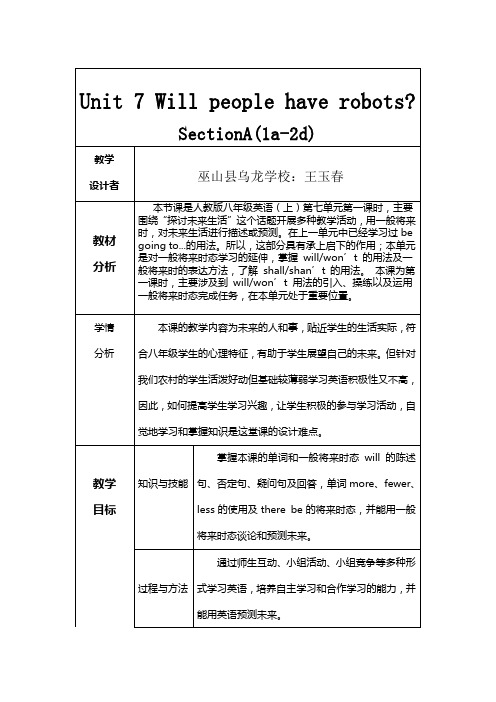八年级英语上册Unit7Willpeoplehaverobots第1课时SectionA1a_2d课时测试题
- 格式:doc
- 大小:45.50 KB
- 文档页数:5




Unit 7 Will people have robots?Section A 1 (1a-2d)一、教学目标:1. 语言知识目标:1) 能掌握以下单词:paper, pollution, prediction, future, pollute, environment, planet, earth, plant, part, play a part2) 能掌握以下句型:①What will the future be like?Cities will be more polluted. And there will be fewer trees.②Will people use money in 100 years?③Will there be world peace?④Kids will study at home on computers.⑤They won’t go to school.2) 能了解以下语法:will + 动词原形来表达一般将来时态。
3)学会表达自己对未来的看法;学会谈论自己未来的打算。
2. 情感态度价值观目标:通过引导学生展望未来,及对未来生活的设计,来达到前景教育的目的,同时也通过对前景的设想,让学生在潜移默化中反省自己的现状,使之对目前的学习、生活习惯作适当的调整,并不断的改善自己的现状,使学生的理想观和价值观更为科学,更具发展价值。
二、教学重难点1. 教学重点:1) 学习掌握一般将来时态的意义和结构。
2) 掌握There be句型的一般将来时态的结构。
2. 教学难点:掌握more/fewer;more/less的用法。
情态动词will + 动词原形来表达一般将来时态。
三、教学过程Ⅰ. Warming up1. 在大屏幕上向学生展示一些机器人的图片,让学生们说出谈论自己的未来的工作,对工作的打算等:What do you want to be when you grow up?Ss: I want to be a scientist.T: How are you going to do that?Ss: I’m going to study science hard.….2. 学生们根据图片来引导出机器人这一话题。

Unit 7 Will people have robots?Section A 1 (1a-2d)一、教学目标:1. 语言知识目标:1) 能掌握以下单词: pap er, pollution, prediction, future, pollute, environment, planet, earth, plant, part, play a part2) 能掌握以下句型:① What will the future be like?Cities will be more polluted. And there will be fewer trees.② Will people use money in 100 years?③ Will there be world peace?④ Kids will study at home on computers.⑤ They won’t go to school.2) 能了解以下语法:will + 动词原形来表达一般将来时态。
3)学会表达自己对未来的看法;学会谈论自己未来的打算。
二、教学重难点1. 教学重点:1) 学习掌握一般将来时态的意义和结构。
2) 掌握There be句型的一般将来时态的结构。
2. 教学难点:掌握more/fewer;more/less的用法。
情态动词will + 动词原形来表达一般将来时态。
三、教学过程Ⅰ. Lead-in1. 在大屏幕上向学生展示一些机器人的图片,让学生们说出谈论自己的未来的工作,对工作的打算等:What do you want to be when you grow up?Ss: I want to be a scientist.T: How are you going to do that?Ss: I’m going to study science hard.….2. 学生们根据图片来引导出机器人这一话题。

第7单元 Will people have robots?Section A 单词paper n.纸;纸张 pollution n.污染;污染物 future n.将来;未来pollute v.污染 environment n.环境 planet n.行星earth n.地球;世界 plant v.种植 n.植物 part n.部分peace n.和平 sea n.海;海洋 build v.建筑;建造sky n.天空 prediction n.预言;预测短语play/take a part 参与;发挥作用 on computers 在电脑上 on paper 在纸上on the earth 在地球上 free time空闲时间 in danger处于危险之中live to be 200 years old活到200岁句型1. People will have robots in their homes.人们的家里会有机器人。
2. Everything will be free.一切东西都将是免费的。
3. Will people live to be 200 years old? 人们会活到200岁吗?Section B 单词apartment n.公寓套房 space n.太空;空间human adj.人的 n.人 dangerous adj.有危险的;不安全的already adv.已经;早已 factory n.工厂Japan 日本 believe v.相信;认为有可能disagree v.不同意;持不同意见;有分歧 even adv.甚至;连;愈加agree v.同意;赞成;应允 shape n.形状;外形fall v.& n.倒塌;跌倒;掉落 n.(美式)秋天 inside adv.& prep.在……里面possible adj.可能存在或发生的;可能的 word n.单词;词impossible adj.不可能存在或发生的;不可能的side n.一方(的意见、态度、立场) probably adv.很可能;大概during prep.在……期间 holiday n.假期;假日短语space station 太空站;宇宙空间站 in the future 在未来hundreds of许多;大量 over and over again 多次;反复地wake up 醒来 fall down突然倒下;跌倒;倒塌look for 寻找;寻求句型1. Today there are already robots working in factories. 现在已经有机器人在工厂里工作了。


Unit 7 Will people have robots?Section A 1 (1a-2d)一、教学目标:1. 语言知识目标:1) 能掌握以下单词: paper, pollution, prediction, future, pollute, environment, planet, earth, plant, part, play a part2) 能掌握以下句型:① What will the future be like?Cities will be more polluted. And there will be fewer trees.② Will people use money in 100 years?③ Will there be world peace?④ Kids will study at home on computers.⑤ They won’t go to school.2) 能了解以下语法:will + 动词原形来表达一般将来时态。
3)学会表达自己对未来的看法;学会谈论自己未来的打算。
2. 情感态度价值观目标:通过引导学生展望未来,及对未来生活的设计,来达到前景教育的目的,同时也通过对前景的设想,让学生在潜移默化中反省自己的现状,使之对目前的学习、生活习惯作适当的调整,并不断的改善自己的现状,使学生的理想观和价值观更为科学,更具发展价值。
二、教学重难点1. 教学重点:1) 学习掌握一般将来时态的意义和结构。
2) 掌握There be句型的一般将来时态的结构。
2. 教学难点:掌握more/fewer;more/less的用法。
情态动词will + 动词原形来表达一般将来时态。
三、教学过程Ⅰ. Lead-in1. 在大屏幕上向学生展示一些机器人的图片,让学生们说出谈论自己的未来的工作,对工作的打算等:What do you want to be when you grow up?Ss: I want to be a scientist.T: How are you going to do that?Ss: I’m going to study science hard.….2. 学生们根据图片来引导出机器人这一话题。

Unit 7 Will people have robots学习目标:1.把握本课的重要辞汇短语及句子:将、会——机械人——树木——纸张——每件事物——较少的——污染——活到——免费——一百年后——更少的人——空闲时刻——更少污染—2.把握以下重要句型1.People will have robots in their homes.2. People won’t use money, everythi ng will be free.3. Books will only on computers not on paper.4. Kids won’t go to school.They’ll study at home on computers.5. There w ill only one country.6. People will live to be 200 years old.学习重难点:本课显现的生词及短语:2) 能正确运用“Will +动词原形”和There will be +名词表示以后。
能力目标:初步熟悉will表示一样以后时的用法和there be 句型表示一样以后时的用法。
温习可数名词和不可数名词并能正确利用more, fewer和less。
教学进程:S tep1 RevisionRevise the contents learnt last period and have a dictation.Step2 展现交流教师在黑板上画一个时刻轴,标记出three years ago、now、in 100 years,让学生先看前两个时刻点,描述出自己的情形。
讨论:预言一百年后的世界将是什么样子??然后听录音,选出你所听到的单词,并把下面的句子读熟。
1.People will have ro bots in their homes.2. People won’t use money, everything will be free.3. Books will only on comp uters not on paper.4. Kids won’t go to school.They’ll study at home on computers.5. There will only one country.6. People will live to be 200 years old.Step3 对话练习。

Unit 7 Will people have robots?Section A 1 (1a-2d)一、教学目标:1) 能掌握以下单词:paper, pollution, prediction, future, pollute, environment, planet, earth, plant, part, play a part2) 能掌握以下句型:①What will the future be like?Cities will be more polluted. And there will be fewer trees.②Will people use money in 100 years?③Will there be world peace?④Kids will study at home on computers.⑤They won’t go to school.2) 能了解以下语法:will + 动词原形来表达一般将来时态。
3)学会表达自己对未来的看法;学会谈论自己未来的打算。
二、教学重难点1. 教学重点:1) 学习掌握一般将来时态的意义和结构。
2) 掌握There be句型的一般将来时态的结构。
2. 教学难点:掌握more/fewer;more/less的用法。
情态动词will + 动词原形来表达一般将来时态。
三、教学过程Ⅰ. Lead-in1. 在大屏幕上向学生展示一些机器人的图片,让学生们说出谈论自己的未来的工作,对工作的打算等:What do you want to be when you grow up?Ss: I want to be a scientist.T: How are you going to do that?Ss: I’m going to study science hard.….2. 学生们根据图片来引导出机器人这一话题。
Ⅱ. Presentation1. 引导学生们看大屏幕上的图片,根据图示来理解will来表达一般将来时态。

Unit 7 Will people have robots?(Section A 1a-2c)一、教材分析:(一)、本节教材的地位和作用本课是新目标英语八年级上册的第七单元的Section A 的第一部分,本节教材所涉及内容在中考中占有相当重要的地位。
本节教材围绕着“将来发生的事”展开,要求学生学习和运用“will+v(原)”构成的一般将来时态。
本课教学内容与学生的实际生活相关,可以利用学生的想象,引导学生运用简单的英语来描述将来的生活和事物。
在学习活动中,学生通过对将来发生的事情的描述,促进学生对美好未来的憧憬。
(二)、教学目标:(1)知识与技能1.指导学生学习有关将来要发生的事情的表达及语法知识点“一般将来时” 。
2.培养学生的口头表达能力、阅读理解能力和写作能力。
1. 学习有关的单词及词组:robot, paper, pollution, tree, subway, computer, will, won ’ t ,they’ll, fewer, be free, on paper, live to be, in 100 years, etc. 2. 学习重要句型:(1)People will have robots in their homes. (2)Will people have robots?. (3)Kids won’ t go to school. (4) There will be less pollution. 3. 掌握语法点:The Simple Future Tense ( 一般将来时) (1)教师自制的多媒体课件;(2)上课环境为多环境。
(2)情感目标:通过学生对自己in five years 的展望,设想自己五年,十年,甚至是二十年后的生活,贴近学生生活实际,符合学生好奇的心理,激发学生浓厚的学习兴趣。
(3) 学习策略:通过任务型的教学,让学生学会自主学习,归纳总结,培养主动学习的能力。


Unit 7 Will people have robots(1a-2c)一、教材分析:1.教材内容:本单元的标题为本单元是Go for it (八年级上册) Unit 7 Will people have robots?第一课时Section A(1a-2C),主要围绕“Talk about the future life谈论未来的生活”这一主题展开各种教学活动,并以这一主题引出一般将来时的肯定句,一般疑问句,否定句以及特殊疑问句等语言功能。
本课时安排了许多贴近学生生活的活动,如谈论自己10年后的生活,假想100年后人们的生活,和人们生活环境的变化,通过这些活动,学生加强对目标语言的理解,着重培养学生的口语交际的能力,在进行了大量的语言输入之后,通过多次的听力练习,着重培养学生听录音,做出相应的听力活动。
活动和练习的形式灵活多样,既有客观性的口语训练,又有开放性的练习形式,从多角度对学生的语言技能进行训练;同时,进行相应的写作练习。
本单元旨在创造一个轻松、愉快的学习、交流环境,通过听、说、读、写来培养学生综合运用这些知识的能力。
并让学生能在“做中学”(learning by doing),通过有限的课堂实践活动,拓展以往的经历,能准确地用英语来表达。
2. 教材的地位及作用:本单元围绕谈论未来的生活,学习使用一般将来时时态。
通过让学生们对自己理想生活(dream life)的描述,反复运用句型what will be in ten years? I’ll be/work…. 来激发他们使用本单元所学单词的兴趣。
教材中提供的所有活动都以一般将来时时态为中心,通过一系列的听、说、读、写的训练,来加深对一般将来时时态的理解,明白英汉两种在结构及表达方法的一些异同点;本课时素材的中心话题是:10年或100年后,人们的生活会怎么样(工作,居住的地方,生活质量,环境污染)。
通过学生的阅读及写作,从而近一步提高学生学习英语的兴趣;同时,提高学生运用所学语言的综合能力。

Will people have robots?New words and phrasesTeaching and Learning Goals(教学目标):一、知识和能力目标:1。
能争取学会使用下列词汇造句子(Curriculum words)paper, pollution, future, environment, planet, earth, plant, part, peace,sea, sky, apartment, space, human, dangerous, already, factory, believe,disagree, even, shape, fall, inside, possible, probably, word2. 能争取学会使用下列常用短语造句子(Useful expressions)play a part, over and over again, hundreds of, fall down, look for,during the holiday,3。
能认读下列词汇(non—curriculum words)prediction, astronaut, rocket, servant二、学习策略Remember the Curriculum words and phrases according to the specific situations。
(在语境中记忆单词)三、情感目标:Protect the environment (保护环境)Teaching and Learning Steps(教学步骤):Step 1 Learn to read the words and phrases on P127-128。
1。
Read the new words using the phonetics(音标)and underline the words difficult to pronounce (难发音的单词)。



八年级英语上册 Unit 7 Will people have robots?(第1课时)教学设计一. 教材分析八年级英语上册Unit 7 Will people have robots?(第1课时)的主要内容是讨论未来机器人的普及情况。
本课时包括一个对话和一个阅读材料,通过这些内容让学生学会使用一般将来时态谈论未来事物的发展。
本课时的话题贴近学生的生活,能够激发学生的学习兴趣,培养他们用英语进行交流的能力。
二. 学情分析八年级的学生已经掌握了基本的英语语法知识和一定的词汇量,具备了一定的听说读写能力。
他们对未来科技的发展充满好奇,对于机器人这一主题会有较高的学习兴趣。
然而,学生对于一般将来时态的运用还不够熟练,需要在课堂上进行大量的练习和操练。
三. 教学目标1.知识目标:学生能够掌握一般将来时态的构成和用法,正确运用动词的一般将来式谈论未来。
2.能力目标:学生能够听懂、会说、会读、会写关于未来机器人的相关句子,能够在日常生活中运用一般将来时态进行交流。
3.情感目标:学生通过对未来机器人的讨论,培养对科技发展的兴趣和好奇心,增强学习英语的积极性。
四. 教学重难点1.重点:学生能够掌握一般将来时态的构成和用法,能够正确运用动词的一般将来式谈论未来。
2.难点:学生能够在实际情境中灵活运用一般将来时态进行交流,并能正确运用相关词汇描述未来机器人的功能和特点。
五. 教学方法1.情境教学法:通过设定未来世界的场景,让学生在实际情境中学习和运用一般将来时态。
2.任务型教学法:通过小组讨论和角色扮演等任务,培养学生的合作意识和运用英语进行交流的能力。
3.交际法:通过师生互动和学生之间的互动,让学生在交流中学会运用一般将来时态。
六. 教学准备1.教学课件:制作与本课时相关的内容,包括对话和阅读材料,以及相关的练习和活动。
2.教学素材:准备一些关于机器人的图片、视频等素材,用于激发学生的学习兴趣。
3.录音机和磁带:用于播放对话和听力材料。
Unit 7 Will people have robots?Unit 7第1课时Section A (1a-2d)测试时间:15分钟测试日期:年月日学生姓名:分数: /15I. 根据句意及汉语提示完成句子1. Please pass me a piece of ______________(纸).2. Air ___________________(污染) is a big problem in this area.3. Do you really care nothing about your ______________(未来)?4. She is not used to the new ______________(环境).5. April is the time to ______________(种植) trees.6. Will we live on another _____ (行星)?II. 单项选择1. _______ an English party in our school this Friday.A. There will beB. There is going to haveC. There will haveD. There is going have2. —Will people live to be 300 years old in the future?—No, ______.A. they aren’tB. they won’tC. they don’tD. they can’t3. —______ do you think the kids will study in 15 years?—They _____ at home on computers.A. Where; studyB. What; will studyC. Where; will studyD. What; study4. We won’t use money, because everything will be _____.A. expensiveB. cheapC. busyD. freeIII. 根据汉语意思完成句子1. 我想每个家庭将有一个机器人。
I think every home _________ _________a robot.2. 或许未来一切都是免费的。
Perhaps everything _________ _____ _________ in the future.3. 我们希望将来污染更少。
We hope _________ _________ _________ _________ pollution in the future.4. 城市在未来将会很大、很拥挤吗?_________ cities _________ very big and crowded in the future?5. 我们可以节约用水,多栽树,人人都应参与保护地球。
We can use less water and__________more trees. Everyone should ____________________ __________ in saving the earth.参考答案I. 根据句意及汉语提示完成句子1. paper2. pollution3. future4. environment5. plant6. planetII. 单项选择1. A there be结构的一般将来时为There will be…或There is/are going to be…,故选A。
2. B 根据问句句意“将来人们会活到300岁吗?”可知为一般将来时,故否定回答为“No,th ey won’t. ”,故选B。
3. C 由上文中的will可知,下文也是一般将来时;由at home可知上文提问的是地点。
故选C。
4. D 由主句意思可知,物品将会是免费的。
故选D。
III. 根据汉语意思完成句子1. will have2. will be free3. there will be less4. Will; be5. plant; play a partUnit 9 Can you come to my party?Unit 9第5课时(Section B 4-Self Check)测试时间:15分钟测试日期:年月日学生姓名:分数: /21I. 根据句意及首字母或汉语提示完成句子1. I wrote several letters to her, but she didn’t (答复) to me.2. My father used to take me to the ____________(音乐会).3. The ____________ (事件) took place many years ago.4. He was sad that most of the g weren’t happy at his birthday party.5. You can find the date of Christmas on the c .6. We will see the _____________(开幕式) of the film next month.II. 用括号中所给词的适当形式填空1. We should make _________________ ( prepare) for the welcome party.2. I’m _______________ (surprise) to see you in Shanghai.3. Ms. Clark came into the classroom without ________________ (say) a word.4. She refused his _________________ (invite) to the party.5. Thank you for __________________ (help) me so much.6. He is planning ______________ (print) some articles for us.7. Miss Smith refused ________________ (answer) the question.8. I’m glad ______________ (see) you again.9. I don’t know if she will ______________ (accept) his gift.10. I would like to invite you to the _______________ (open) of our new store.III. 根据汉语意思完成句子1. 你能在周末的时候来打篮球吗?Can you come to play basketball_________ _________ _________?2. ——你能帮他学法语吗?——当然了,我很乐意。
—Can you help him with French?—Sure, _________ _________ _________.3. 星期日去看望你的祖父母怎么样?_________ _________going to visit your grandparents on Sunday?4. 明天我能够为数学考试而学习。
I’ll_________ _________ _________study for the math test tomorrow.5. 今天放学后我们去听音乐会吧。
_________ _________ _________the concert after school today.参考答案I. 根据句意及首字母或汉语提示完成句子1. reply2. concert3. event4. guests5. calendar6. openingII. 用括号中所给词的适当形式填空1. preparations2. surprised3. saying4. invitation5. helping6. to print7. to answer8. to see9. accept 10. openingIII. 根据汉语意思完成句子1. on the weekend2. I’d love to3. What about/How about4. be able to5. Let’s go toUnit 1 Where did you go on vacation?Unit 1第2课时Section A (Grammar Focus-3c)测试时间:15分钟测试日期:年月日学生姓名:分数: /20I. 根据句意及首字母提示完成句子1. —Would you like s to eat?—Yes, please.2. Money is something, but it is not e .3. —Is e here today?—No, Wang Lin and Zhang Ping are both ill.4. There must be s in the room. We can hear him talking.5. I keep a d in English every day.II. 用所给词的适当形式填空1. The weather _____ (be) hot and humid yesterday.2. They _____ (have) Sichuan food last night.3. —What is Jim doing?—He _____ (do) his homework now.4. The music sounds _____ (relax). I love it very much.5. They _____ (not go) to the beach last Sunday.III. 单项选择1.—Who teaches ________ music?—Nobody. I teach ________.A. mine; myselfB. your; myselfC. you; myselfD. you; yourself2. —How do you like the movie?—I think it’s great, but my brother feels it very_______.A. boredB. boringC. relaxedD. relaxing3. —Tom, I’m going to work. Please look after ______well.—Don’t worry, Mom. I will.A. herselfB. myselfC. yourselfD. himself4. Fishing with Dad was so ________for little Sam that he almost fell asleep.A. excitedB. excitingC. boredD. boring5. —Help _______ to some candies, children.—Thank you.A. youB. yourC. yourselfD. yourselvesIV. 按要求完成句子,每空一词1. They went to Beijing on vacation. (对画线部分提问)__________ __________ they _________ on vacation?2. My vacation was pretty good. (对画线部分提问)___________ ___________ your vacation?3. We had a good time at the party yesterday. (改为一般疑问句)___________ you ___________ a good time at the party yesterday?4. He had noodles for lunch today. (改为否定句)He ___________ ___________ noodles for lunch today.5. —Were they at work last Sunday? (作出否定回答)—_______, ___________ ___________.参考答案I. 根据句意及首字母提示完成句子1. something2. everything3. everyone4. someone5. diaryII. 用所给词的适当形式填空1. was2. had3. is doing4. relaxing5. didn’t goIII. 单项选择1. C 考查反身代词的用法。